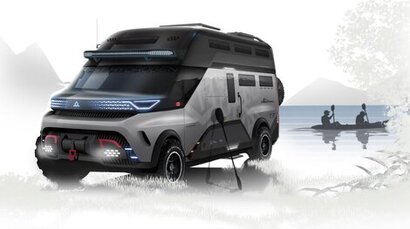
The vehicle has been designed to incorporate spacious living quarters, a large front windshield and good ground clearance and has been developed in partnership with global mobility experts EDAG Group. The release follows the reveal of First Hydrogen’s concept for its Generation II light commercial vehicle (LCV). The Company is also developing concepts for vehicles with a winch or towing capability and that have trailers or cargo boxes.
Fuel cell electric vehicles (FCEVs) can cover larger ranges and manage heavier payloads loads than equivalent battery electric vehicles (BEVs), attributes that are attractive for the recreational vehicle market. RVs travel long distances, often into the wilderness away from refuelling or charging infrastructure, making long range especially appealing. Refuelling a FCEV takes mere minutes, approximately the same amount of time as a petrol or diesel vehicle, whereas recharging electric vehicles can take hours, which inhibits the freedom that van life demands. Additionally, in the same way that delivery vans might need to run refrigeration units and emergency vehicles power medical equipment; recreational vehicles run auxiliary loads such as cookers and water boilers, applications suited to FCEVs. BEVs require more battery cells to power these loads, adding to overall vehicle weight, depleting the vehicles’ energy more quickly.
The market for recreational vehicles has grown hugely in the past few years, the North American market was valued at $56.29 billion in 2022 and is anticipated to reach $107.6 billion by 20321. Similarly, the European leisure market is growing, with record sales of 260,000 new vehicles in 2021 and sustained high demand in 2022, with vehicle sales slightly reduced due to availability and issues in the global supply chain. Typically, leisure vehicle drivers are more environmentally conscious and already adopting hybrid vehicles or greener fuel alternatives such as biofuels to reduce their carbon footprint. First Hydrogen sees an opportunity for hydrogen-powered vehicles to support this growing market reach zero emissions alongside commercial vehicle sectors.
The news follows the announcement that First Hydrogen is successfully starting 12-18-month-long commercial vehicle trials with its Generation I fuel cell LCV. In collaboration with the UK Aggregated Hydrogen Freight Consortium (AHFC), road trials are commencing with award-winning fleet management company, Rivus.
“The First Hydrogen campervan is an example of how we see hydrogen fuel cell and other electric vehicle technologies having wider applications” said Steve Gill, CEO of Automotive for First Hydrogen. “We are successfully demonstrating the potential fuel cell technology has in the LCV class but are exploring how the technology can benefit other sectors including leisure vehicles. Connecting with nature is incredibly important for recreational vehicle owners and this concept indicates how a hydrogen vehicle could help people preserve the environment while enjoying van life.”
Bernat Costa, Design Director at EDAG Spain, added that the design for the camper shares similar design principles with the Generation II series; it is a clean, modern look that prioritises function and acknowledges the van’s green fuel technology.
“It also shares the daytime-running light configuration, which makes the campervan instantly recognisable as a First Hydrogen vehicle” said Mr Costa. “Ultimately, it incorporates features that are desirable for leisure vehicles, such as good vehicle lighting, which is especially useful for vehicle visibility when parked on the roadside or as a source of light when camped away from civilisation.”
For additional information:

